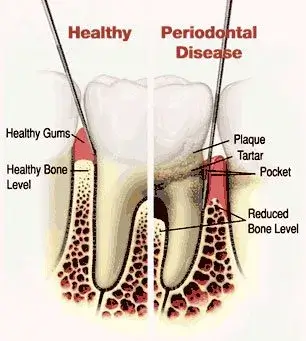Periodontal disease can affect one tooth or many teeth. It begins when the bacteria in plaque (the sticky, colorless film that constantly forms on your teeth) causes the gums to become inflamed.

Gingivitis is the mildest form of the disease where the gums can redden, swell and bleed easily. There is usually little or no discomfort. Gingivitis is often caused by inadequate oral hygiene. Gingivitis is reversible with professional treatment to periodontitis. With time, plaque can spread and grow below the gum line.
Toxins produced by the bacteria in plaque irritate the gums. The body in essence turns on itself, and the tissues and bone that support the teeth are broken down and destroyed.
Gums separate from the teeth, forming pockets (spaces between the teeth and gums) that become infected. As the disease progresses, the pockets deepen and more gum tissue and bone are destroyed. Often, this destructive process has very mild to almost no symptoms. Think of it as if bugs are eating away at the soil around a tree trunk. Eventually, they eat away all of the soil and part of the tree’s roots, causing the tree to collapse.
I Would Like to Make a Gum Disease Treatment Visit
How To Keep a Healthy Smile for Life
For a healthy smile it is important to keep both your gums and teeth healthy. The best way to do this is to see your dentist and hygienist every 6 months and do the treatment that you need that has been recommended for you.

Treatment of Periodontal Disease
Periodontal health should be achieved in the least invasive and most cost-effective manner. This is often accomplished through non-surgical periodontal treatment, including scaling and root planning (a careful deep cleaning of the root surfaces to remove plaque and calculus (tartar) from deep periodontal pockets and to smooth the tooth root to remove bacterial toxins).
Most dentists and specialists would agree that after scaling and root planning, many patients do not require any further active treatment, including surgical intervention. However, the majority of patients will require ongoing maintenance therapy to sustain health. Non-surgical therapy does have its limitations, however, and when it does not achieve periodontal health, surgery may be indicated to restore periodontal anatomy damaged by periodontal diseases and to facilitate oral hygiene practices.
